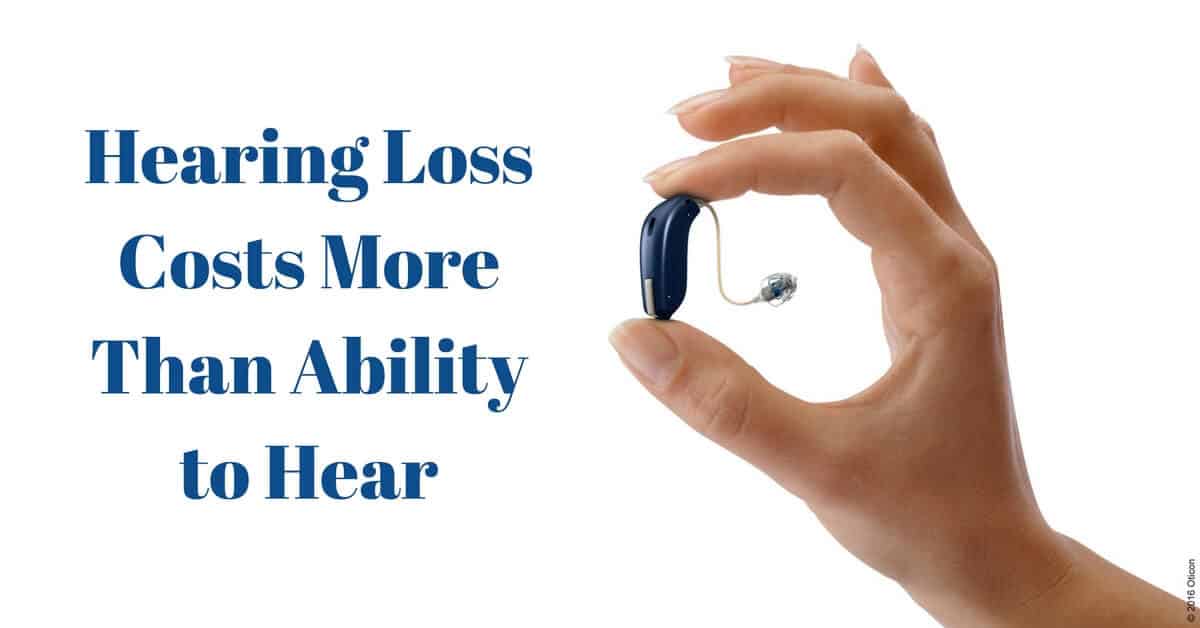Untreated hearing loss means so much more than missed conversations. The far-reaching hidden costs of untreated hearing loss involve physical, mental, emotional, academic and economic impacts that are difficult to quantify.
An estimated 48 million Americans report having some hearing loss, yet relatively few seek help and often delay seeking solutions for many years. Hearing impaired persons who have gradually lost hearing ability may be in denial or embarrassed about the problem. Whatever the reason, the avoidance of addressing hearing loss and pursuing treatment comes at tremendous cost to the quality of life one can expect to enjoy.
Coping Mechanisms
People who are gradually losing their ability to hear often will develop strategies to hide their hearing loss, all pointing to avoidance of acknowledging the problem and thereby seeking help. While these mechanisms may help delay the inevitable, they are actually adding to the difficulties associated with hearing loss.
Some of these include:
• Bluffing – Simply nodding, smiling, indicating understanding while not having a clue. This can lead to mistakes, misunderstandings, and a lack of confidence from others in one’s willingness to be upfront about what they hear and understand.
• Dominating the conversation – As long as one is talking, they can control the situation to an extent. Of course, this leads to lost opportunities to truly learn and communicate.
• Withdrawal – This devastating strategy, involving staying physically busy, focused on something outside the conversation, “checking out”, can have a profound effect on one’s relationships. This is different from social isolation, because it is employed at social gatherings, in a room full of people, and can often be interpreted as lack of interest or rudeness.
• Selective Hearing – There are so many factors related to the speaker, the listener, and the environment that influence ones’ ability to understand. One with hearing loss can choose to be an active listener by selectively focusing on that which they deem important.
Mental and Emotional Effects
So much of what makes us human is social contact and interaction with other human beings.
Being able to communicate effectively is vital to one’s mental health. Because of this, some of the biggest concerns are the psychological effects of hearing loss.
There is a stigma associated with hearing loss, which contributes to feelings of anger, frustration, and depression. Also associated with this is a lowered self-esteem and feelings of inadequacy. A common misperception among those who can hear is that people with hearing loss are slow or even senile, when nothing could be further from the truth. These perceptions, over time, can be internalized for the hearing impaired, adding to the negative psychological impact.
Social Impact
For those experiencing hearing loss, the costs to one’s social life can be tremendous. Conversation becomes difficult, true interaction is nearly impossible, and can result in misunderstandings on both sides. Persons with hearing impairment become frustrated with the effort to hear and understand, and hearing persons can interpret the resulting withdrawal as indifference. This, in turn, often leads to isolation and avoidance of social settings.
Academic and Economic Effects
Academic experience and workplace success go hand in hand, and it goes without saying that those with hearing loss who have missed out on a full educational experience detrimental effects on career, earnings, and productivity, and opportunity for advancement in the workplace. Hearing on the job is not only critical in terms of communication, but often job safety as well. Communications problems result in mistakes, performance issues, and accidents.
Physical Effects
The actual physical consequences of untreated hearing loss are often overlooked and undervalued. However, these effects are well-documented and can include:
• Fatigue
• Stress
• Headaches
• Appetite
• Sleeplessness
• Cognitive decline, increased risk of dementia
Safety Issues
Issues of safety and security are vital to understand for those with hearing loss. Missing auditory signals can most certainly impact one’s prospect for survival. Missing the sounds of fire and CO2 alarms, weather alerts, car horns, shouts of warning could have a devastating outcome. Additionally, not hearing the ringing of phones, doorbells, and alarm clocks can have terrible consequences.
The Effect on Others
For the people living, socializing, and working with individuals with untreated hearing loss, the challenges are numerous. Everyone involved is affected in one way or another.
It is undoubtedly frustrating for others who have to go to such extreme means to be heard and understood, and to coexist with hearing impaired people in home and workplace environments, especially when there might be solutions that can help to somewhat normalize the experience.
Fortunately, it doesn’t have to be this way. If you or a loved one are experiencing hearing loss that is affecting your quality of life, contact a hearing professional without further delay. The longer the delay in obtaining hearing aids, the more one misses out and the harder it can be to adjust to hearing aids.
A hearing professional can quantify your hearing loss and lay out options for treatment.
Just think about the effects of re-engaging in life, getting the most out of your hearing environment, and improving not only your social and professional life, but your family relationships as well!
My Hearing Centers
We change lives through better hearing.
Contact us today: (877) 330-2920


